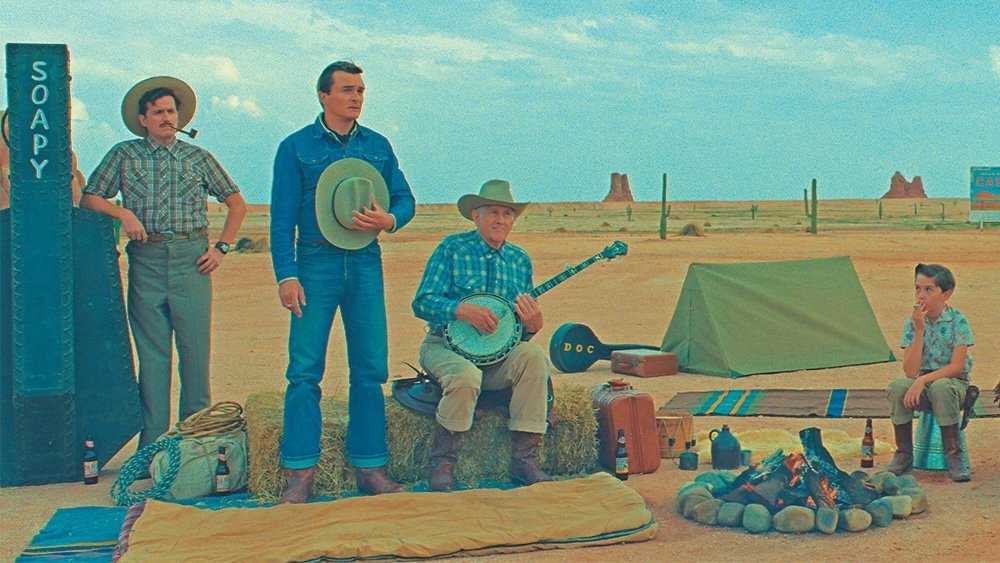“Asteroid City” - Film Review
This review was originally posted on Film Obsessive.
Wes Anderson’s latest feature, Asteroid City, takes audiences to the middle of the desert in the American West. The small town of Asteroid City is built around a massive crater. There’s a single-pump gas station, a diner, a mechanic, an unfinished highway ramp, and a motel. It’s the setting of the 1955 Junior Stargazer convention where Woodrow (Jake Ryan) is going to be celebrated for his scientific pursuits. Accompanying him are his father (Jason Schwartzman) and his three sisters (Ella, Gracie, and Willan Faris). At the convention, the family meets an actress (Scarlett Johansson), her daughter (Grace Edwards), a teacher (Maya Hawke), a general (Jeffrey Wright), a singing cowboy (Rupert Friend), and an alien (which results in Asteroid City being quarantined by the government).
A large part of Anderson’s appeal is the attention to detail. The symmetry, the colors, the effortless sweeps of the camera to and fro. He creates a world that’s just slightly different from our own. A world that’s a little dreamier, brighter, and more intellectual. Many actors thrive in the world Anderson creates, and that’s why he has a consistent cast of players who show up time and again. Jeffrey Wright’s voice was made to recite Anderson’s convoluted, high-brow dialogue in a cadence that lulls the audience into a stupor. The lively pace of the script, mixed with quick editing and dynamic camera movement, makes for a spectacle. Maybe it’s not as bombastic as a Damien Chazelle feature, but Anderson’s vision remains singular and immersive.
Courtesy of Pop. 87 Productions/Focus Features
Anderson has captured this feeling time and time again. It’s impressive to create a series of films with a cinematic language all their own, a distinct style that’s oft-replicated but never fully captured. Every aspect of an Anderson movie is purposeful. Something as small as an eye movement or as large as an alien landing is an opportunity for Anderson to create a deftly choreographed series of movements. It’s because of this style that Asteroid City feels like it’s missing a strong heartbeat. With every aspect of the film feeling planned in such a miniscule way, it’s impossible to deliver the gut punch the theme requires.
The backdrop of Asteroid City is a Junior Stargazer convention meant to harken back to the days of the Space Race. When people looked to the night sky and saw limitless possibilities. A time when there was an unbridled passion for a world beyond our own. That passion lives on in many people now, but space doesn’t capture the world’s attention like it did during the ’50s and ’60s. That was a period where people all over the world were filled with the wonder of planets, rocket ships, and astronauts. It was nice living in Asteroid City’s retro-futuristic world and seeing a convention exist to celebrate the possibility of alien life and the furthering of human possibilities.
Unfortunately, the sense of wonder never comes across in these characters, even as an alien descends from its spacecraft to steal the town’s famous asteroid. To wonder, to stumble, to hurt, and to laugh are all distinctly human qualities. In a sense, the characters of Asteroid City are alien. They never laugh, and their actions feel predetermined and planned. And in a way, they are. Asteroid City is a play within a movie, so these are actors playing characters in multiple definitions. Even the sets of the American West have been constructed for the film (which was shot in Spain) and for the play. There’s an overall air of rigidity and formula, but the best work is made to remind the audience of our humanity. The good and bad parts.
Credit: Courtesy of Pop. 87 Productions/Focus Features
Asteroid City has moments that break through the haze and speak to a universal experience, but the film’s structure is too overloaded. There are storylines within the play and outside of it that seem to exist only so Anderson’s usual crew can make an appearance. Willem Dafoe has less than five minutes of screentime, Jeff Goldblum appears for maybe 30 seconds, and Edward Norton’s role is slim at best. Newcomers to Anderson’s world like Hawke, Sophia Lillis, Edwards, and Ethan Lee are exciting young talents who could have done much more. Even the bulk of the story, the quarantine of the town, is lost to a time jump masquerading as an act break in the play.
Despite this, it’s difficult to fully write off Asteroid City because the movie does have a faint heartbeat. Maybe it’s personal preference to want that heart to beat loudly and be seen proudly on the film’s sleeve, but that simply isn’t Anderson’s calling card. There’s only so much humanity that can come across in Anderson’s perfectly tweezed world, but when it does, it feels calming. Like a soothing balm for the weary world.
Near the end of the film, one of the actors complains that they don’t understand the purpose and the point of their actions. They walk offstage and ask the director what the intention of all this is and the director replies, “just keep telling the story.” It’s advice we should all take. The meaning of life is generally unknowable, except to say that connection through storytelling is at the core of humanity’s purpose. Asteroid City has its head looking up to the stars, its feet on the ground, and its heart just barely peeking out of its sleeve.
Follow me on BlueSky, Instagram, Letterboxd, & YouTube. Check out Movies with My Dad, a new podcast recorded on the car ride home from the movies.


